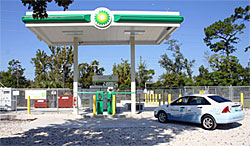OVIEDO, Fla. Dec. 11, 2007 -- Ford Motor Company, BP and the state of Florida have marked an important milestone in their collective path towards the use of hydrogen as viable alternative fuel for the future by opening a second hydrogen station that will fuel a fleet of Ford Focus fuel cell vehicles.
The new station is part of the Ford-D.O.E. Controlled Hydrogen Fleet and Infrastructure Demonstration and Validation Project. Ford and BP officials were joined today by members of the Florida Department of Environmental Protection, Progress Energy Florida and the U.S. Department of Energy (D.O.E.).
"This opening represents another step forward for hydrogen as an alternative fuel," said Sheral Arbuckle with Ford Motor Company's Research and Advanced Engineering Department. "We have made much progress in hydrogen propulsion over the past 15 years and we are pleased that our energy partner, BP, continues to support this project with the much needed infrastructure to fuel our vehicle fleet. This is another major milestone in this joint government and industry initiative."
One of the hydrogen-powered Ford Focus vehicles gives the Department of Environmental Protection (DEP) park rangers a pollution-free ride during everyday operations at Wekiwa Springs State Park, which attracts nearly 185,000 visitors annually. Home to a handful of freshwater springs, the 8,000-acre park protects the headwaters of the Wekiva River. Two more vehicles are utilized by DEP's Central Regulatory District for field inspections. Progress Energy's energy-efficiency specialists and customer account managers are using the remaining three hydrogen-fueled cars at their Jamestown Operations Center.
"Florida is pleased to be opening the state's second hydrogen fueling station in six months," said DEP Secretary Michael W. Sole. "By using state-of-the-art technology such as hydrogen to fuel six vehicles in Central Florida we are demonstrating the power of innovation."
The hydrogen demonstration project is part of an initiative unveiled in 2004 by the U.S. Department of Energy. Through the federal government's Controlled Hydrogen Fleet and Infrastructure Demonstration and Validation Project, Ford supplied the Florida DEP and Progress Energy with six hydrogen-powered Ford Focus fuel cell vehicles. BP America supplies the cars with hydrogen fuel through a grant from the state of Florida.
"BP is committed to developing cleaner fuels," said Maria Curry-Nkansah, BP's hydrogen business development manager. "With this station, we will continue our work to gain real-world experience in hydrogen fueling infrastructure and help build public awareness of this developing technology. This program is an example of how government, energy companies and the auto industry are working collaboratively to assess the potential of hydrogen as an alternative fuel."
Ford, Chevron and Progress Energy Florida opened the state's first hydrogen station in Orlando in May. This station fuels four Ford Hydrogen-powered shuttle buses used at the Orlando airport and provides a test platform for showcasing the production, storage and dispensing of hydrogen fuel.
Research into hydrogen, including partnering to begin to build an infrastructure, is part of Ford's overall efforts to address the challenges of climate change and energy independence. Ford is moving ahead with a range of technological solutions simultaneously, such as hybrid electric vehicles, plug-in hybrids, hydrogen fuel cell vehicles; hydrogen internal combustion engines, ethanol, clean diesel and refinements to gasoline based powertrains and advanced transmissions. Some of the technologies represent near term solutions. Others, such as hydrogen, must be viewed as longer term options.
Ford first began working on hydrogen technology in the early 1990s. Ford's first hydrogen internal combustion engine demonstration vehicle, released in 2001, was based on a lightweight aluminum sedan body, which also was used in the development of the company's first drivable hydrogen fuel cell vehicle.
The company currently has a fleet of 30 hydrogen-powered Focus fuel cell vehicles on the road as part of a worldwide, seven-city program to conduct real world testing of fuel cell technology. The fleet has accumulated more than 650,000 miles since its inception. With this fleet on the ground, information is being generated in different local environmental conditions that can be integrated into future fuel cell vehicle propulsion systems.
As a hydrogen infrastructure is developed and implemented for the fleet at each of its locations, lessons learned are being generated to insure that the customer and hydrogen fueling interface is seamless and customer friendly.


